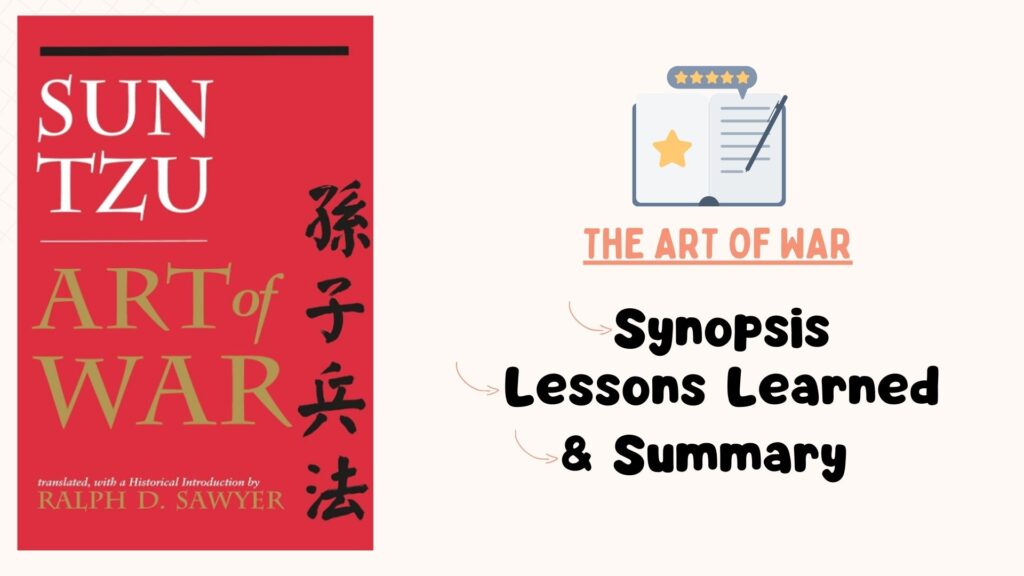Greetings, entrepreneurs and business mavens! Today, I want to share with you the invaluable business lessons I learned from delving into the ancient wisdom of Sun Tzu’s “The Art of War.” Many may see this timeless classic as a military strategy guide, but I assure you, its applications in the business world are profound. As an avid reader and a passionate student of history, I believe that we can draw tremendous inspiration and insights from the teachings of this ancient Chinese general. So fasten your seatbelts, because we’re about to embark on a journey of enlightenment and discover how we can apply these age-old principles to our modern-day business endeavors.
Understanding the Terrain
To truly understand the business landscape, one must first grasp the concept of ‘Understanding the Terrain’ as outlined in the timeless classic, The Art of War. The wisdom from Sun Tzu is as relevant today as it was centuries ago, and it can provide valuable insights for modern business leaders.
The Market Is Your Battlefield
An important lesson from The Art of War is that the market is your battlefield. Just like in ancient warfare, the business arena is full of competition, challenges, and opportunities. To succeed, you must study the market terrain, identify your competitors, and understand the dynamics at play.
Understanding the market terrain means knowing the strengths and weaknesses of your competitors, recognizing the shifting trends, and identifying the areas where you can gain a strategic advantage. By understanding the battlefield, you can position your business for success and anticipate the moves of your rivals.
Adapting Sun Tzu’s Strategies to Understand Your Competition
Tzus strategies for understanding your competition can be directly applied to the modern business world. By analyzing the strengths and weaknesses of your competitors, you can anticipate their actions and develop effective counter-strategies. By understanding your competition, you can position your business as the leader in your industry and stay ahead of the game.
The insights from The Art of War provide valuable lessons for business leaders looking to navigate the ever-changing market terrain. By adapting Sun Tzus strategies to understand the competition, you can gain a competitive edge and achieve long-term success in the business world.
The Art of Business Warfare
Any entrepreneur knows that running a business is a constant battle. In my experience, one book that has provided invaluable insights into the tactics and strategies of successful business warfare is ‘The Art of War’ by Sun Tzu. This ancient text may be a military treatise, but its principles can be directly applied to the world of business, teaching us important lessons that can be utilized to achieve victory in the marketplace.
Preparation is Key: What Military Strategy Teaches Us About Market Research
Teaches us that in both warfare and business, thorough preparation is essential for success. Sun Tzu emphasizes the importance of understanding the competitive landscape and the strengths and weaknesses of your rivals. This directly translates to the necessity of conducting extensive market research in the business world. By gathering as much information as possible about your industry, competitors, and target audience, you can make well-informed decisions and gain a competitive advantage.
Furthermore, The book highlights the value of adapting to changing circumstances, another important aspect of market research. By staying attuned to market trends and consumer behaviors, businesses can adjust their strategies and offerings to remain relevant and meet the evolving needs of their audience.
Knowing When to Fight and When to Wait: Timing in Business Ventures
When it comes to business warfare, timing is critical. Sun Tzu emphasizes the importance of choosing the right moment to engage in battle and when to bide your time. This principle applies directly to the world of business ventures. Entrepreneurs must carefully assess the timing of their product launches, marketing campaigns, and business expansions. By identifying the optimal timing, businesses can maximize their chances of success and minimize risks.
What’s more, understanding the timing of industry shifts and market fluctuations allows entrepreneurs to capitalize on emerging opportunities and avoid potential pitfalls. By mastering the art of timing, businesses can strategically position themselves for long-term success in the ever-changing business landscape.
The Element of Surprise: Innovation and Disruption in the Marketplace
An effective business strategy often involves the element of surprise, much like in warfare. Sun Tzu emphasizes the importance of maintaining secrecy and unpredictability to gain a competitive edge. This principle can be applied to the world of business through innovation and disruption. By introducing groundbreaking products, pioneering new technologies, or reinventing traditional business models, companies can captivate consumers and outmaneuver their competitors.
Market disruption and innovation are key components of staying ahead in the business warfare. By constantly challenging the status quo and thinking outside the box, businesses can carve out their own unique position in the market and establish themselves as formidable contenders. Embracing the element of surprise allows businesses to capture attention, generate buzz, and solidify their place as industry leaders.
Tactical Alliances and Partnerships
For entrepreneurs and business owners, forming tactical alliances and partnerships is crucial for long-term success. By leveraging the strengths of others, you can build a formidable business army that can overcome any obstacle in the marketplace.
The Power of Networking: Building Your Business Army
Partnerships are the lifeblood of any successful enterprise. In today’s hyper-connected world, your network is your net worth. Surrounding yourself with like-minded individuals and complimentary businesses can open doors to new opportunities and strategic collaborations. Whether it’s through industry events, digital networking, or good old-fashioned relationship building, the power of networking can elevate your business to new heights.
Strategic Partnerships: The Allies of Your Business
Tactical alliances are not just about making connections, they are about forging strategic partnerships that can create a mutually beneficial relationship. By aligning your business with the right partners, you can tap into additional resources, expertise, and customer bases that would have been difficult to reach on your own. These alliances can also provide a layer of protection and support, allowing your business to navigate through challenges with greater resilience and adaptability.
Alliances, partnerships, networking, strategy, business, tactical, allies
Leadership Lessons from the Front Lines
Despite being an ancient military treatise, The Art of War by Sun Tzu provides timeless wisdom that can be applied to the modern business world. The book offers valuable insights into leadership, strategy, and tactics that are incredibly relevant for today’s entrepreneurs and business leaders.
Leading with Vision: The Role of a Commander in Business
Lessons from The Art of War emphasize the importance of a leader’s vision in guiding the organization towards success. Just like a commander on the battlefield, a business leader must have a clear vision and the ability to communicate it effectively to the team. The commander’s role is to inspire and lead the troops towards a common goal, and in business, the same principle applies. A leader’s vision sets the direction for the company and motivates the team to work towards a shared objective.
Tactics of Motivation: How to Inspire Your Team to Victory
With The Art of War as a guide, business leaders can learn powerful tactics to motivate and inspire their teams. Sun Tzu’s emphasis on morale, unity, and discipline provides valuable insights for cultivating a winning mindset within the organization. By implementing these tactics, leaders can create a high-performing team that is driven to achieve success and overcome challenges.
To inspire your team to victory, incorporate Sun Tzu’s principles of morale, unity, and discipline. By fostering a positive and cohesive environment, you can empower your team to conquer obstacles and achieve extraordinary results.
Decision Making in the Heat of Battle: Handling Business Crisis
Decision-making under pressure is a critical aspect of leadership, and The Art of War offers invaluable guidance on this front. Sun Tzu’s strategic principles can be applied to navigate through business crises and make effective decisions when the stakes are high. By understanding the art of swift and decisive decision-making, leaders can steer their organizations through turbulent times and emerge victorious.
Tactics for handling business crises involve swift and decisive decision-making, strategic thinking, and the ability to adapt to rapidly changing circumstances. By applying Sun Tzu’s teachings, leaders can navigate through challenges and lead their organizations towards success.
Resource Management
Keep
Knowing the Enemy
Not knowing your enemy is one of the biggest mistakes a business can make. In today’s competitive market, it’s crucial to have a deep understanding of your rivals and their strategies. Sun Tzu’s ‘The Art of War’ emphasizes the importance of knowing your enemy, and this lesson is just as applicable in the world of business as it is on the battlefield.
Competitive Analysis in the Style of Sun Tzu
Knowing your competition inside and out is essential for success. Sun Tzu advises studying your enemy’s strengths and weaknesses, understanding their tactics, and identifying their vulnerabilities. In a business context, this means conducting thorough competitive analysis to gain insights into what your competitors are doing, what sets them apart, and where they may be vulnerable. By understanding your enemy, you can develop strategies to outmaneuver them and gain a competitive advantage.
Encountering the Unpredictable: Adapting to Market Changes
Any business operating in a dynamic market knows that change is inevitable. Sun Tzu’s teachings on adapting to the unpredictable can be directly applied to how businesses navigate market shifts and disruptions. Recognizing that the business landscape is constantly evolving, and being prepared to adjust strategies and tactics accordingly, is critical to staying ahead of the game.
Enemy Your competition, market changes, Sun Tzu, business lessons, The Art of War, strategy, competition, adaptability, market analysis, business success.
Secrets to Victory
Unlike many other business strategy books, ‘The Art of War’ delves into the secrets to achieving victory in business. The lessons in this ancient text provide powerful insights that can be applied to modern business practices.
The Strategy of Indirectness: Why Obvious Moves Are Often Wrong
On the surface, it may seem like the most direct and obvious strategy is the best path to victory. However, ‘The Art of War’ teaches us that this is not always the case. In business, the strategy of indirectness can be a powerful tool. By taking unexpected and unconventional actions, you can catch your competitors off guard and gain a significant advantage. This concept reminds us that in business, as in war, a predictable approach can often lead to defeat.
The Importance of Psychological Warfare: Branding and Market Position
An often overlooked aspect of business is the psychological warfare that takes place in the minds of consumers. By carefully crafting your branding and market position, you can influence how your audience perceives your company and products. This psychological warfare can give you a significant edge over your competitors and help you to secure a dominant position in the market. ‘The Art of War’ reminds us that in business, as in war, perception is often more important than reality.
Any business looking to gain a competitive advantage should carefully consider the psychological aspects of their branding and market position. By understanding the power of perception and leveraging psychological warfare, you can increase your chances of success in the marketplace. This concept is a timeless lesson from ‘The Art of War’ that continues to be relevant in today’s business world.
Ethics and the Art of War
Your business and ethical considerations go hand in hand, and understanding the importance of ethics in the business world is crucial for long-term success. Sun Tzu’s ‘The Art of War’ provides valuable insights into ethical considerations and the impact they can have on your business strategy. Let’s dive into some of the key lessons on ethics that can be gleaned from this timeless classic.
Winning Without Corruption: Ethical Considerations
Winning in business doesn’t mean resorting to corruption or unethical practices. Sun Tzu emphasizes the importance of maintaining integrity and upholding ethical standards while striving for victory. As a business leader, it’s essential to build a reputation based on trust and honesty, as this will ultimately contribute to your long-term success. By staying true to your values and operating with integrity, you can earn the respect and trust of your employees, partners, and customers, which will serve as a solid foundation for sustainable growth.
The Long-term Vision: Building a Sustainable Business
Considerations for the long-term vision of your business should always be at the forefront of your strategic planning. Sun Tzu’s teachings highlight the significance of building a sustainable business that can withstand the test of time. This involves making decisions that not only benefit your business in the present but also lay the groundwork for future growth and longevity. By prioritizing long-term sustainability, you can create a business that is built to last, adapting to changes in the market and consistently delivering value to your stakeholders.
Longterm success, ethical considerations, sustainable growth, business strategy, Sun Tzu, The Art of War, integrity, trust, strategic planning, market adaptation, value delivery.
Modern Case Studies
Now let’s delve into some modern case studies that perfectly illustrate the timeless lessons from The Art of War:
- 1. Amazon’s expansion into new markets using strategic alliances and competitive intelligence.
- 2. Apple’s innovative product launches and ability to stay ahead of the competition.
- 3. Netflix’s disruptive approach to content delivery and customer retention strategies.
- 4. Tesla’s bold moves in the electric car industry, leveraging strengths and exploiting weaknesses of competitors.
Analyzing Successful Businesses Through the Lens of “The Art of War”
With the principles from The Art of War, we can dissect the success stories of modern businesses like Amazon, Apple, Netflix, and Tesla. By applying strategies such as knowing the competition, adapting tactics, and taking calculated risks, these companies have achieved remarkable success. They have mastered the art of positioning themselves in the market, understanding their customers’ needs, and seizing opportunities to dominate their industries.
Mistakes and Lessons: What Failed Businesses Teach Us
Any entrepreneur can learn valuable lessons from failed businesses, such as Blockbuster and Kodak, which failed to adapt to changing market dynamics and technology. These cautionary tales emphasize the importance of agility, innovation, and constant vigilance in the face of shifting business landscapes. By studying their missteps, we can avoid similar pitfalls and build resilient, forward-thinking companies.
As we navigate the ever-evolving business world, it’s crucial to learn from both triumphs and failures, applying the wisdom of The Art of War to seize opportunities and mitigate risks in our own entrepreneurial endeavors.
My Personal Journey
After years of being immersed in the business world, I stumbled upon a book that would change the way I approached my entrepreneurial journey – The Art of War. The ancient Chinese military treatise, written by Sun Tzu, provided me with valuable insights and strategies that I could apply to my own business endeavors.
Integrating “The Art of War” into My Business Philosophy
An essential lesson that I took away from The Art of War was the significance of strategy and planning in business. Sun Tzu emphasized the importance of understanding both your strengths and weaknesses, as well as those of your competitors, before engaging in any strategic business move. This principle led me to adopt a more calculated approach to decision-making, allowing me to anticipate potential challenges and opportunities in the market.
Additionally, I learned the art of leveraging momentum and timing from The Art of War. Sun Tzu’s teachings on the importance of seizing opportunities and understanding the ever-changing nature of the business landscape have been crucial in shaping my business philosophy. By embracing this mindset, I have been able to capitalize on favorable circumstances and make strategic moves that have propelled my business forward.
Real-world Applications and Outcomes
Applications of the strategies outlined in The Art of War have led to tangible outcomes in my business. By implementing Sun Tzu’s principles, I have been able to gain a competitive edge in the market, outmaneuvering rival businesses and carving out a unique position in the industry. The strategic approach has also enabled me to foster alliances and strategic partnerships, further strengthening my business’s position and influence in the market. The wisdom from The Art of War has empowered me to adapt to the dynamic nature of business, ensuring that I stay ahead of the curve and capitalize on emerging opportunities.
The transformative impact of integrating The Art of War into my business philosophy has been immense. It has allowed me to navigate complexities with confidence, anticipate market shifts, and make informed decisions that have driven sustainable growth. The timeless principles from The Art of War continue to serve as a guiding beacon in my entrepreneurial journey, shaping my approach to leadership, strategy, and competition.
Summing up
Considering all points I covered in this book, it’s clear The Art of War teaches timeless business strategies that are still relevant today. From the importance of understanding your competition to the value of strategic planning, there are plenty of lessons to be learned from Sun Tzu’s classic text. It’s essential to stay adaptable and always be willing to evolve your approach to business, just as Sun Tzu advises in his teachings.
Overall, The Art of War provides valuable insights and strategic thinking that can be applied to modern business practices. It’s critical to remain agile and always be on the lookout for new opportunities, just as Sun Tzu emphasizes the importance of being flexible and willing to adapt in the face of adversity. This book is certainly a must-read for anyone looking to gain a deeper understanding of business strategy and how to effectively navigate the competitive landscape.












